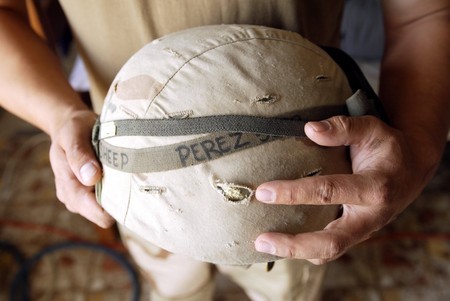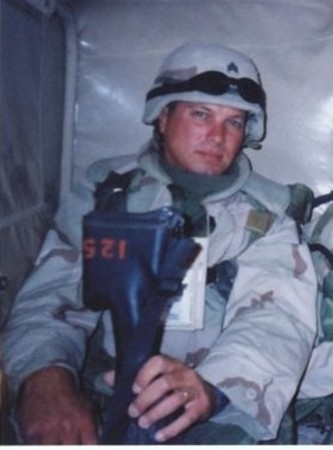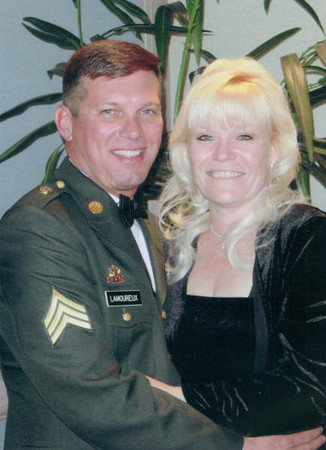Iraq war veteran awaits shooting trial as wife looks for help
Joseph "Pat" Lamoureux couldn't erase from his mind the sight of the young Iraqi girl walking up to his heavy equipment transport truck and blowing herself up.
"Her body parts were all over his vehicle," his wife, Sue, said about the 2003 suicide bomber attack.
She said her husband was knocked down from the blast and later was evaluated for traumatic brain injury. In a benefits claim he filed with the Department of Veterans Affairs, Lamoureux wrote that the Iraqi girl, who was 12 to 14 years old, "came out of nowhere."
Then there was a firefight near the Baghdad airport and, later, an old man with a donkey who wouldn't stop when soldiers hollered at him. "He was 'lit up,'" Sue Lamoureux wrote in a July 1 e-mail. "To this day Pat believes the old man may have been deaf, and the image of him haunts Pat."
She said it was the weight of post-traumatic stress from these and other incidents that caused her 46-year-old husband to mentally collapse last September. That's when he went on a shooting spree that began in their mobile home at Terrible's Lakeside RV Park and Casino in Pahrump and ended after a pre-dawn gunbattle with Nye County sheriff's deputies.
Lamoureux was wounded and surrendered. He has been charged with multiple felony counts of attempted murder with use of a deadly weapon. His preliminary hearing is expected to be held next month in Nye County Justice Court in Pahrump.
The case is another one with undertones of post-traumatic stress disorder, or PTSD, involving local military personnel who returned from combat and committed violent acts, adding to a fast-growing problem among those who have served in Iraq and Afghanistan.
In January, 24 soldiers committed suicide, topping the combat deaths for that month in both war zones.
In February, Senior Airman Jason Klinkenberg, who had been treated at Nellis Air Force Base and off base for PTSD, shot and killed his wife and then himself in their North Las Vegas apartment.
In another case, former Army Spc. Matthew Sepi, an Iraq veteran who had sought help for PTSD, shot and killed a woman and wounded a man with an AK-47 rifle while walking in 2005 to a Las Vegas convenience store to buy beer. Murder charges were dismissed after a prosecutor concluded he acted in self-defense. Sepi pleaded guilty to lesser charges and was ordered to undergo drug and alcohol counseling at a Department of Veterans Affairs facility. Those convictions were dropped after he completed treatment.
Robert J. Brown, a staff sergeant who was Lamoureux's convoy commander on most of his missions, said the convoys were shot at "day and night."
"If you stopped, you got shot. We were sitting ducks outside of that wall, wire, perimeter or sand berm."
Brown said he routinely positioned Lamoureux's truck in the middle of a convoy that usually stretched four miles between the lead truck and rear truck. Lamoureux was armed with a Squad Automatic Weapon.
"When Pat says what happened at the airport, that happened," Brown said Tuesday from Brooke Army Medical Center in Texas.
On top of that, Sue Lamoureux describes the "tremendous guilt" her husband felt after he was airlifted to Germany with a breathing disorder, only to learn later that Staff Sgt. Cameron Sarno, one of his fellow Army Reserve soldiers in the Las Vegas-based 257th "Rolling Thunder" Transportation Company, was killed in Kuwait when another truck slammed into Sarno's while he was changing a tire on Sept. 1, 2003.
Early on in the deployment, Lamoureux's convoy stopped where an Iraqi tank crew had burned to death. One body "was stuck to the side of the tank" and her husband has since been haunted by the smell of burnt flesh, Sue Lamoureux said.
"That night before things spiraled out of control, Pat was screaming, 'Sarno' at me. I told him there wasn't anything about that situation that was his fault," Sue Lamoureux said. "And he screamed at me again. 'Sarno, you don't know. ... I could have kept him from dying.'"
To no avail, Sue Lamoureux tried to make her husband understand that Sarno's death was a tragedy that he couldn't have prevented.
The discussion escalated into a confrontation that prompted her to pack up some belongings and her laptop computer and leave.
"That's when he snapped," she said.
Before her quick exit, he took her laptop and reached for his pistol. As she drove away, he apparently fired many rounds from a .45-caliber pistol into the laptop.
Nye County sheriff's deputies responding to the domestic disturbance call were immediately engaged in a gunbattle.
One of them, Eric Murphy, was wounded as Pat Lamoureux fired from behind boulders and trees with two different weapons. After about 15 minutes, Lamoureux was shot in his lower legs by deputies who fired in the direction of pistol muzzle flashes, Nye County Sheriff Tony DeMeo said July 2.
"He had a battle plan laid out, and he executed that battle plan," said DeMeo, a Vietnam War veteran. "My deputies used professional restraint to bring him into custody for his due process."
Lamoureux's case has been assigned to attorney Thomas Gibson, managing partner of a law firm that is contracted as Nye County's public defender.
Gibson said Lamoureux has been found competent to stand trial.
"A big plus for our defense is that he was with a VA (Department of Veterans Affairs) hospital and they had prescribed him over 20 different medications, any two of which had the possibility of affecting his judgment and ability to reason," Gibson said.
He would not disclose what role post-traumatic stress disorder might play in Lamoureux's defense.
"I can tell you he has been diagnosed with PTSD and that he was definitely overmedicated by VA doctors at the time of the incident," Gibson said.
A VA spokesman in Las Vegas, David Martinez, said privacy laws preclude officials from divulging information about Lamoureux's health care.
DeMeo said he doesn't know about Lamoureux's PTSD or whether it would have made a difference in his deputies' response. "We responded to a domestic disturbance with shots being fired," he said.
Symptoms of post-traumatic stress disorder include nightmarish flashbacks sometimes experienced by combat troops and first responders. The disorder can cause sleep loss and erratic, impulsive behavior and make a person short-tempered.
DeMeo said if Sue Lamoureux was so aware of her husband's PTSD problems, "it should have been incumbent upon her to remove those weapons from the residence."
Sue Lamoureux said her husband had never shown signs of being a violent person, and she had no reason to believe he would ever use a weapon against anyone except in a combat situation.
Unable to raise enough money to cover her husband's $2.5 million bail, she has started a blog at jpldefense.blogspot.com to seek help for his legal defense. It includes such recent postings as "The Price of Freedom" and "PTSD -- Memories Frozen in the Mind -- My Own Story of PTSD."
She has unsuccessfully sought financial help from the Army Reserve.
John D. Wagner, a spokesman for the 63rd Regional Support Command that includes Army Reserve units in Nevada, said Lamoureux hasn't been under the Army Reserve's umbrella since his discharge in 2004.
"The guy has been out of the Army for five years. This is purely a civilian matter, so the Army Reserve has no plans to be involved in his legal defense," Wagner said.
Sue Lamoureux said her husband was honorably discharged for his respiratory condition and had no criminal record. She said her husband also hasn't received help from the VA for his medical or mental problems while being held at the Nye County detention facility or the state's Lakes Crossing mental health center in Sparks.
The VA's position is that the institution where he is incarcerated is obligated to provide health care. She was told by detention officials that she must pay for his medications. Just one of those, for his respiratory condition, costs $400 per month.
Sue Lamoureux said the VA is shirking its duty.
"The way they are handling this case is horrible," she said, noting that soldiers "go to war, they serve the country, and they come home broken."
"The VA fails them and then the VA turns (its) back on them. Our country needs to take care of our veterans even in our worst times of trouble.
"I hope I can make things easier for other families because I know as I try to help Pat, I hit a brick wall around every corner."
Sue Lamoureux said her husband's breathing problem began as a reaction to an anthrax inoculation and was exacerbated by oil fires and sand storms in Iraq. "His lungs were damaged and he was sent over with severe pneumonia," she said.
Before he was airlifted to Germany, he gave his Kevlar helmet to his buddy, Spc. Ron Perez, whose own helmet had been crushed by a truck.
"Pat and Ron were both sick at the same time. Ron had malaria, and Pat was essentially suffocating," Sue Lamoureux wrote in an e-mail.
Later, Lamoureux's helmet withstood a sniper's bullet while Perez was wearing it. After the unit returned to Las Vegas, Perez came to Lamoureux's home to return the helmet.
According to Sue Lamoureux, Perez said, "'Sergeant Lamoureux, your Kevlar saved my life. Sorry it got damaged on my watch, but it belongs to you, and I want you to have it back.' It was a very emotional moment. There was not a dry eye in the room."
Contact reporter Keith Rogers at krogers @reviewjournal.com or 702-383-0308.




















